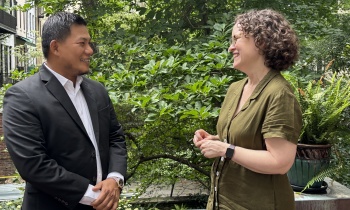Humanitarian Challenges in Myanmar: Navigating Conflict and Crisis

On 9 July, the Quaker United Nations Office hosted a private briefing on Myanmar’s humanitarian crisis in the aftermath of the devastating 7.7 magnitude earthquake that struck on 28 March 2025. At Quaker House, Gum San Nsang, Secretary of the Kachin Political Interim Coordination Team, briefed UN diplomats. With the monsoon season threatening to worsen the humanitarian crisis, he emphasized the need for the international community to address aid distribution issues, reminding them that “each day later is a day worse than before.”
In his remarks, Gum San noted that the distribution of humanitarian assistance has been exacerbated by the dwindling control of the military junta that seized control during a coup in 2021. He explained that the military has prevented aid from reaching parts of the country not under its control, while diverting aid to its own stockpiles.
Beyond the focus on humanitarian issues, Gum San also addressed the ongoing conflict situation between the military and armed resistance groups. He highlighted that the struggle to control the mining of rare earth minerals represents a major driver of conflict, especially in northern Myanmar.
Currently, the UN’s Office of Coordination of Humanitarian Affairs (OCHA) estimates that 20 million people, over one third of the population, are in need of assistance. Despite the significant levels of need, aid delivery remains inconsistent and restricted. The military Junta primarily allows humanitarian aid to reach cities under their control, such as Naypyidaw. Meanwhile, rural and conflict-affected areas, often governed by Ethnic Armed Organizations, are being overlooked.
The ongoing conflict further disrupts aid operations. The Office of the High Commissioner of Human Rights reports upward of 50 attacks on aid workers. Most notably the Junta fired on a Chinese Red Cross convoy, highlighting the risks on the ground. While some assistance has reached border regions, current efforts fail to meet urgent needs. As aid workers struggle to deliver help in conflict zones, inequitable access to assistance hits vulnerable populations the hardest.
Meeting participants were grateful for the opportunity to learn more about the situation on the ground. QUNO remains committed to lifting the voices of communities affected by violence and fostering dialogue and deeper understanding among UN stakeholders. Briefings such as these aim to support the UN in efforts to ensure humanitarian access for all, including those in Myanmar.
Image: QUNO Director, Sarah Clarke (right), talks with Gum San Nsang (left) on the Quaker House terrace.


